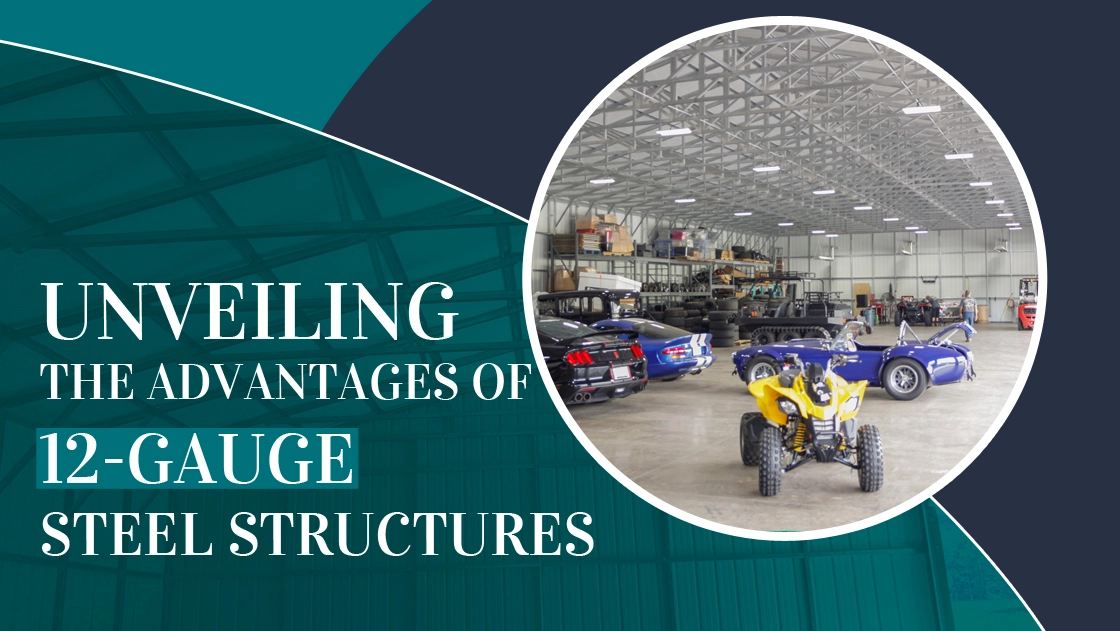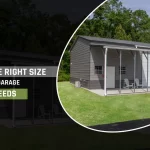Unveiling The Advantages Of 12-Gauge Steel Structures
March 26, 2024
If you’re in the market for steel buildings, there are several options to consider, including those with variable thickness. Steel frame thickness can range from 12 gauge to 16 gauge, affecting the price. Are you unsure which steel gauge to choose? Let’s explore the options to find the best one for you in terms of cost and quality.
Metal Type – Galvanized Steel
There are many types of metals, such as aluminum, zinc, copper, and steel. Steel has the best strength-to-weight ratio but tends to rust. This can easily be tackled by using galvanized steel.
Here, steel is dipped in hot, molten zinc to create an even coating that acts as a protectant. This creates a shield between the outer environment and steel, thereby preventing corrosion. Some features of galvanized steel include durability, versatility, high tensile strength, and recyclability.
Thickness of The Steel Frame
i) 12 Gauge: Thickest & most durable frame available for steel buildings.
ii) 14 Gauge: Industry standard, generally adopted for residential purposes. These are the most economical.
iii) 16 Gauge: Good for non-residential metal buildings like a garden or tool shed.
Types of Steel Buildings
A 12 gauge steel can support any of the following structures:
- Metal Carport
- Enclosed Carport
- Metal Garage
- A-frame Barn
- Triple Wide Garage
- Clear Span Metal Barn
- Lean-to (It can be attached to any of the above structures or to the wall of your home)
Highlighting the Benefits of 12 Gauge Steel Buildings
1. Thickness
A 12 gauge steel is 0.1046 inches thick. Comparatively, 14 gauge is 0.0747 inches, and 16 gauge is 0.0598 inches. Note that thickness actually influences the amount of load a frame can carry. 12 gauge metal can carry a weight of 4.276 lbs. per sq. ft., compared to 14 gauge, which is 3.047 lbs. per sq. ft.
2. Width
12 gauge metal square tubing has a thicker wall, giving more strength and load-bearing ability without being extensively heavy.
3. Design
12 gauge steel is designed to sustain dynamic pressure. Hence, it is generally recommended for areas with harsh weather conditions. Some local zoning/ building codes may ask you to build a steel frame of 12 gauge.
4. Certification
Often, certification is tagged along with 12 gauge steel thickness. These are designed by professional engineers. You can get a better insurance premium against certified steel as it is fire-resistant and retains structural integrity with time.
5. Price
Because 12 gauge steel is thicker and slightly heavier, it is priced higher than 14 gauge steel. Remember, when you buy a steel building, you are paying for the steel.
6. Warranty
Since 12 gauge steel is designed and certified by engineers, it comes with a warranty. So, don’t forget to ask about it with your metal dealer to get the bang for your buck.
7. Applications
In commercial and industry buildings, 12 gauge is generally used as structures are large and need to bear more load. Oftentimes, a clear span steel building is required to install machinery and sections as per industry requirements.
8. Durable
How strong is 12 gauge steel? They have high tensile strength. They are the best option available in the market. They definitely cost more than 14 or 16-gauge frames and posts, but they are sturdy & built to last long.
Bonus: Performance Against Weather
12 gauge steel frame performs best against extreme weather conditions. You can get an engineer-certified steel building that can withstand wind speed up to 170 miles per hour, a snow load of 40 lbs. per sq. ft. or more, and with 6:12 pitch vertical corrugated metal panels, rainwater & more snow will slide off quickly. They are easy to clean as well.
Some Common Uses Of Metal Buildings With 12 Gauge Steel Thickness
- Warehouse steel building
- Retail store
- Manufacturing unit
- Factory outlet
- Cold storage
- Office
- Automobile center
- Commercial hangar
What Steel Panels Gauge is Available With 12 Gauge Steel Framing
- 22 Gauge – 0.0299 – heaviest
- 24 Gauge – 0.0239
- 26 Gauge – 0.0179 – (Industry standard)
- 29 Gauge – 0.0135 – lightest
See Why Our 12 Gauge Steel Building Is Right For You
We offer certified steel buildings that can be tailored to client’s needs. You can customize roof style and color and incorporate additional features such as lean-to. Contact Viking Metal Garages today to know more about 12 gauge framing.
We follow the gauge size standard for different materials. Get in contact with our team and find your ideal steel building. Call (704)-741-1587 to get your personalized quote.

